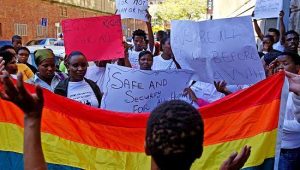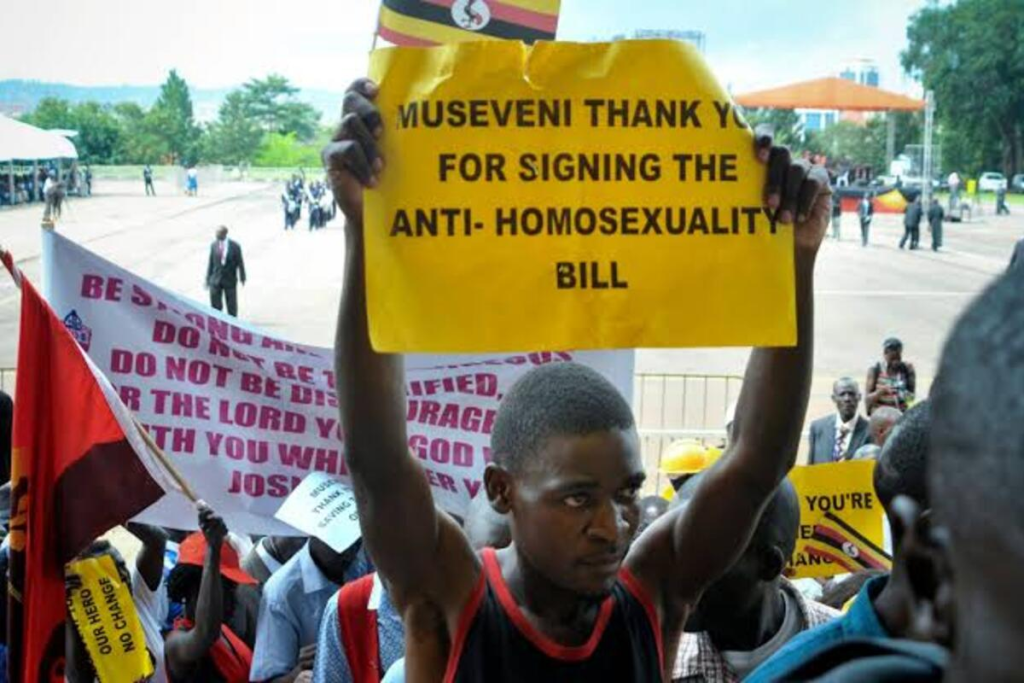Last week, Uganda passed anti-gay legislation that has been widely criticized as one of the harshest in the world. Alex, a gay man living in Uganda, expressed his fear of being arrested, stating that he cannot pretend to be someone he is not. The new law has sparked outrage and concern for the safety and well-being of the LGBTQ+ community in Uganda.
The Anti-Homosexuality Bill 2023 has been a topic of controversy and debate, as it is now available for transmission to President Yoweri Museveni. The bill has faced pressure from the United Nations and the United States to be rejected. The bill’s stance on homosexuality has been a point of contention, and its potential impact on the LGBTQ+ community has been a concern for many. As the bill awaits the president’s decision, many are watching closely to see what the future holds for the LGBTQ+ community in Uganda.

In a legislative session filled with chaos and numerous amendments, a bill was enacted. However, there seems to be a lack of understanding among lawmakers and analysts regarding the provisions of the bill.
Activists have raised concerns over the potential consequences of Ugandan President Yoweri Museveni’s approval of a new anti-gay bill. If passed, the bill would impose life imprisonment for anyone engaging in same-sex activity, with repeat offenders facing the death penalty. This has sparked outrage among human rights advocates who argue that such legislation would violate the basic rights of the LGBTQ+ community and further marginalize an already vulnerable group. The bill has yet to be signed into law, but its potential impact on the lives of LGBTQ+ individuals in Uganda is deeply concerning.
Uganda has recently caught the attention of campaigners for effectively abolishing the death penalty. This is due to the fact that all death sentences in the country are automatically commuted to prison terms.

In Uganda, the situation for LGBTQ individuals is dire. 19-year-old Alex, whose name has been changed for safety reasons, is one of many who are struggling. While there have been some positive developments, such as the decriminalization of same-sex relationships, the reality is that discrimination and violence against LGBTQ individuals is still rampant. For Alex and others like him, there is little comfort in these small victories.
Leaving the only country one has ever known can be a daunting decision, and many are currently faced with this agonizing choice.
In Uganda, online messaging groups have become a source of comfort and solidarity for the LGBTQ+ community. However, these groups also serve as a stark reminder of the ongoing dangers and discrimination faced by queer Ugandans. Despite the challenges, these online communities provide a space for individuals to connect, share experiences, and offer support to one another.
LGBTQ Ugandans who have fled their country and sought refuge in neighboring Kenya, South Africa, Europe, and North America have shared their experiences and recommendations on finding safe spaces and navigating immigration bureaucracy.
Living in a cramped apartment in a Kampala suburb with three roommates and constantly drawing the curtains to keep prying eyes at bay can be quite overwhelming. Alex, a resident of such an apartment, recently expressed a strong desire to flee Uganda.
The statement “I don’t know if I’m safe and I don’t deserve to die because I’m being myself” is a powerful and poignant expression of the fear and uncertainty that many individuals face in today’s society. It speaks to the struggle of those who feel that they are not accepted or valued for who they are, and who fear for their safety and well-being as a result.
This sentiment is particularly relevant in the context of ongoing discussions around issues such as discrimination, prejudice, and violence against marginalized groups. It highlights the need for greater understanding, empathy, and compassion towards those who may be different from ourselves, and for a society that is inclusive and accepting of all individuals, regardless of their race, gender, sexuality, or other characteristics.
Ultimately, the statement serves as a reminder of the importance of standing up for what is right, and of working towards a world in which everyone can feel safe, valued, and respected for who they are.
As individuals, we hold a responsibility to fight for our freedom. It is a duty that we cannot ignore. If we do not stand up for ourselves, then who will? We must take action and fight for our rights.
Overcoming Fear: Why It’s Important and How to Do It
Fear is a natural human emotion that can be both helpful and harmful. It can protect us from danger, but it can also hold us back from achieving our goals and living our best lives. If you find yourself feeling “too afraid” to take risks or try new things, it’s important to understand why and how to overcome that fear.
First, it’s important to recognize that fear is often rooted in our past experiences and beliefs. Maybe you’ve had a negative experience in the past that has left you feeling scared or anxious about similar situations. Or maybe you’ve been told by others that you’re not capable or that you’ll fail, leading to self-doubt and fear of trying.
To overcome fear, it’s important to challenge these beliefs and replace them with more positive and empowering ones. This can be done through self-reflection, therapy, or simply talking to supportive friends and family members who can help you see your strengths and potential.
Another way to overcome fear is to take small steps towards your goals, rather than trying to tackle everything at once. This can help build confidence and momentum, making it easier to take bigger risks in the future.
Finally, it’s important to remember that failure is a natural part of the learning process. Everyone makes mistakes and experiences setbacks, but it’s how we respond to them that determines our success. By embracing failure as an opportunity to learn and grow, we can overcome our fear of it and become more resilient in the face of challenges.
In conclusion, overcoming fear is essential for personal growth and achieving our goals. By challenging negative beliefs, taking small steps, and embracing failure, we can learn to face our fears and live more fulfilling lives.
Uganda has a rich history and has been present for many years.
In 2014, President Museveni’s decision to sign an anti-gay bill into law caused widespread fear and led to a reduction in aid from Western countries. However, the law was later overturned by a court due to a technicality.
In Uganda, President Museveni has been in power since 1986 and is currently 78 years old. He is faced with the challenge of weighing the popularity of a bill among the public against the possibility of facing international criticism.
In a recent statement, Volker Turk, the UN High Commissioner for Human Rights, expressed deep concern over the passing of a discriminatory bill. According to Turk, this bill is likely one of the worst of its kind in the world. The development is troubling and raises serious questions about human rights.
The White House has issued a warning about the possible economic consequences that may arise if the bill is approved.
In the past few months, there has been a rise in unfounded conspiracy theories being spread by religious and political leaders. These theories claim that homosexuals are trying to recruit children on behalf of unknown international forces.
Frank Mugisha, the executive director of Sexual Minorities Uganda, a homosexual rights organization, recently commented on the current situation in Uganda. According to Mugisha, the situation has worsened due to the radicalization of Ugandans. It’s worth noting that Mugisha’s organization’s operations were suspended by the government last year.

According to Mugisha, a source interviewed by AFP, the threat of violence and the desire to flee Uganda is no longer limited to just impoverished citizens. Even the wealthy are now feeling targeted and at risk.
The supervisor of one corporate employee has informed him that he will be fired if the president signs the bill.
Many countries in Africa are currently facing challenges when it comes to LGBTQ rights. Uganda is one of these countries, but it is not alone. Its neighboring countries, such as Kenya and Tanzania, are also taking measures to restrict the rights of the LGBTQ community. In fact, politicians in these countries are even warning against raising awareness of LGBTQ issues. This is a concerning trend that needs to be addressed.
Traveling to the Western part of the world can be a challenging task, even for those who have the financial means to do so.
Philemon, a bar owner in Kampala, has faced visa rejections twice while attempting to join his Danish partner. This has put a strain on their relationship.
In a recent interview with AFP, a 25-year-old man shared that his companion used to visit him every six months. However, he revealed that she is now too afraid to come to Uganda.
Deserving happiness is a concept that many people strive for in their lives. It’s the idea that we should feel entitled to experience joy and contentment, and that we shouldn’t settle for anything less. However, the pursuit of happiness can be a challenging journey, and it’s not always easy to know what we truly deserve.
At its core, deserving happiness means recognizing our own worth and valuing ourselves enough to prioritize our well-being. It means setting boundaries, pursuing our passions, and surrounding ourselves with people who uplift and support us. It also means acknowledging that happiness is not a one-size-fits-all concept, and that what brings joy to one person may not be the same for another.
Ultimately, deserving happiness is about giving ourselves permission to prioritize our own happiness and fulfillment. It’s about recognizing that we are worthy of love, joy, and all the good things life has to offer. So if you’re struggling to feel like you deserve happiness, remember that you are worthy, and that your happiness matters.
The lack of clarity in the legislation is also causing concern.
In a recent conversation, John, a 26-year-old technician who identifies as gay, expressed his thoughts on a particular bill, stating that it appeared to be quite ambiguous.
In a recent interview with AFP, a concerned individual expressed his anxiety over the potential for people to use their power to extort others. His hands were visibly clenched as he spoke about this issue.
In Uganda, the safety of LGBT individuals and their loved ones is at risk. Even friends and family members can face consequences if they suspect someone of being homosexual and fail to report it to the police. This law mandates that citizens who suspect someone “intends to commit the offense of homosexuality” must disclose the matter to the police or face six months in prison.
In a recent interview with AFP, Alex couldn’t help but shed tears as he thought about the difficult situation his mother was facing.
The fear of losing a loved one due to their sexual orientation is a reality for many individuals. Despite having supportive family members, the passing of discriminatory laws can cause a rift in relationships. This is the case for one individual who shared their concern about a bill that could potentially cause their loved one to abandon them. It’s a heartbreaking situation that highlights the importance of fighting against discrimination and standing up for the rights of the LGBTQ+ community.
As with many other LGBT individuals in Uganda, this adolescent is facing the difficult decision of whether to leave the country or not. Unfortunately, their options for doing so are limited.
As I was beginning to explore my sexuality and expand my social circle, everything suddenly changed.
As humans, we all have the inherent desire to be happy. However, sometimes life can throw us curveballs that make us question whether we truly deserve happiness. It’s important to remember that everyone deserves to be happy, regardless of their past mistakes or current circumstances. Happiness is not something that is earned, but rather a state of being that can be cultivated through self-care, positive relationships, and pursuing our passions. So, if you find yourself asking “Do I not deserve happiness?”, remember that the answer is a resounding yes – you deserve to live a fulfilling and joyful life.




